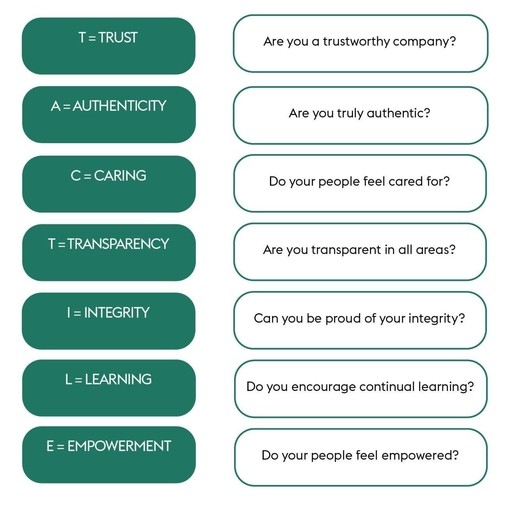2.14. It’s all about the green staff
Key Takeaways 2.13
In a nutshell
Looking after your people is essential.
Ask your employees what they want.
Use the questionnaire to gain understanding and make any necessary changes.
Adopting a conscious culture
Now let’s talk about culture and what it means to your employees. According to the book Conscious Capitalism Field Guide (Sisodia, Henry, Eckschmidt), when you walk into an organisation, you can feel the difference between a ‘conscious’ business and a traditional one, and this is down to culture.
To embed a conscious culture into your business, the book promotes the ‘TACTILE’ approach – an acronym representing seven qualities for companies to consider.
- Trust: A high degree of trust permeates conscious businesses internally and externally with all stakeholders.
- Authenticity: Authenticity is essential to build trust.
- Caring: Feeling cared for and caring for others are core human needs.
- Transparency: Conscious cultures are transparent because there is little to hide.
- Integrity: A strict adherence to truth-telling and fairness are at the heart of business integrity.
- Learning: A continual desire to learn helps businesses successfully evolve.
- Empowerment: Hire people with a strong fit to your company’s culture and empower them to act intelligently and thoughtfully.
How 'TACTILE' is your business
Here are some questions to ask yourself and find out how ‘TACTILE’ your business is. (Adapted from Conscious Capitalism Field Guide, Sisodia, Henry, Eckschmidt)
Photo by: VisitBritain/VisitEngland

Employee sustainability survey
No business can succeed without good people and good people gravitate toward good businesses. Businesses with dubious or questionable ethical stances? They risk failing to attract and retain the talent they require.
As you are establishing your sustainability policies, it’s important to involve everyone in the business to establish their views. Here’s a sample employee questionnaire that may help.
1. What does the term ‘sustainability’ mean to you?
2. How would you describe the company’s current approach to sustainability?
It is central to our corporate strategy. ⬜ It is taken seriously, but we have a long way to go. ⬜ It is currently inconsistent. ⬜ It is currently non-existent. ⬜ 3. On a scale of 1-10, how important is the company’s sustainability performance to you as an employee?
4. On a scale of 1-10, how concerned are you about environmental issues?
5. On a scale of 1-10, how concerned are you about social and societal issues?
6. Which of the following concern you most? Please select 5. (These are suggestion for areas to include. Add or remove where appropriate to your area or business).
Climate change ⬜ Social injustice ⬜ Food waste ⬜ Inequality ⬜ Plastics ⬜ Human rights ⬜ Fossil fuels ⬜ Poverty ⬜ Air pollution ⬜ Clean water and sanitation ⬜ People eating too much meat ⬜ Mental health ⬜ Biodiversity loss ⬜ Diversity and inclusion ⬜ Ocean health ⬜ Animal welfare ⬜ General overconsumption ⬜ Greenwashing ⬜ Fast fashion ⬜ 7. On a scale of 1-10, how likely would you be to switch jobs in order to work for a business you believe to be more responsible and sustainable?
8. On a scale of 1-10 (where 1 = not bothered and 10 = a very important factor), how much do you consider environmental product claims when shopping?
9. What brands do you consider to be particularly environmentally or ethically responsible?
10. Would you boycott a brand if you considered it to be harmful to the environment or unethical (for example, poor working conditions, slave labour, tax avoidance, etc.)?
11. On a scale of 1-10, where would you place your current understanding of sustainability issues?
12. What areas of sustainability would you like to learn more about – from a personal perspective?
13. What areas of sustainability would you like to learn more about – from a work perspective?
14. What training / tools would help you build sustainability into your role?
15. Would you like to be one of our sustainability champions?
Real living wage
Here is how it works. Statutory law requires that all businesses pay their staff the Minimum Wage. Some employers choose to go further and pay the National Living Wage.
Because regenerative tourism is about going one step beyond, you might decide to adopt the Real Living Wage, a calculation that assesses the broader cost of living based on a basket of household goods and services.
For more details on the Real Living Wage, visit the Living Wage Foundation and the government’s page on the minimum and national living wage is kept updated for the latest information on both of those rates.
| Minimum Wage | National Living Wage | Real Living Wage |
|---|---|---|
| £7.55/hr (16-17 year olds) £10.00/hr (18-20 year olds) | £12.21/hr | £13.55/hr across the UK £14.80/hr in London |
| Statutory | Statutory for 21 and over | Voluntary for 18 and older |
| Based on recommendations from businesses and trade unions | A percentage of median earnings, generally updated annually. | Calculation based on cost of living and essential living expenses. |
Diversity, equality and inclusion
The best businesses actively benefit from a dynamic and diverse mix of people. Embracing diversity of contribution leads to diverse, more varied thinking, which is always stronger and more effective than any single narrow view.
Diversity, equality and inclusion is often referred to as the acronym DE&I, with some versions using the word equity rather than equality.
The topic describes three closely linked values held by companies that support a wide range of different groups and individuals, including those of different race, ethnicity, religion, ability, gender, and sexual orientation.
The overall objective is to foster a workplace that is inclusive and flexible, in which everyone is treated fairly and with respect.
Based on the principle that there is more power in unity than division, diverse, equal and inclusive businesses aim to remove bias, hire a wide range of individuals with different backgrounds, and thrive on a variety of perspectives to lead to better outcomes.
Employee health and well-being
Employers have a duty of care for the health, safety and well-being of employees.
It is estimated that 32.5 million working days were lost to work-related ill health in 2019/2020, with stress, anxiety and depression accounting for almost 18 million of those. (Chartered Institute of Personal Development).
It’s important that line managers and supervisors are properly trained to identify issues, support their team, and be flexible if someone needs adjustments to be made to manage their wellbeing at work.
Ideally, access should be provided to mental health support if needed, as well as encouraging physical health through company sponsored initiatives such as gym memberships, running clubs, weekly yoga, and so on.
Healthy food can also help support a healthy team. If an army marches on its stomach, then your staff need to have plenty of energy to be active and think alertly.
And if you have employees still working from home or hybrid working, remember to supply guidelines regarding healthy working set up and management in the home. This should include the importance of taking regular breaks, keeping screen time to sensible levels, having an appropriate desk and computer set up and discussing with other members of the household what suitable work boundaries are in relation to interruptions, and so on.
case study for 2.13
Mother Ivey’s Bay: A case study on the impact of social responsibility:
Mother Ivey’s Bay Holiday Park in Cornwall was the first holiday park in the UK to be fully accredited as a Living Wage employer and the impact of that commitment was immediately clear.
Experienced workers come back year after year ensuring operations run smoothly and efficiently. More broadly, those efforts helped raise the reputation of the tourism and hospitality industry as a sector of choice for workers.
Photo by: VisitBritain/Diensen Pamben

bottom page nav
previous section
next section








